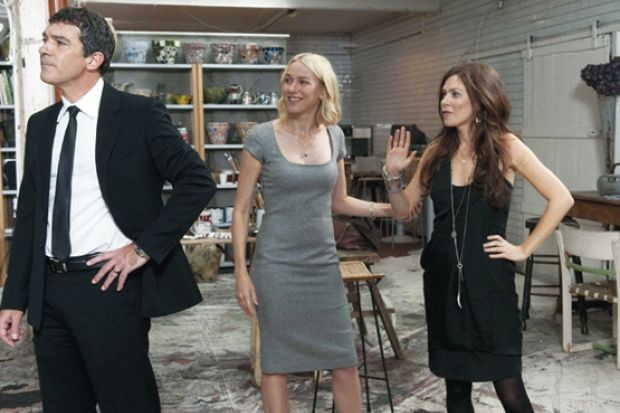You Will Meet a Tall Dark Stranger
Directed by Woody Allen
Starring Gemma Jones, Pauline Collins, Anthony Hopkins, Naomi Watts, Josh Brolin, Antonio Banderas, Anna Friel
Released in the UK on 18 March
Alas, You Will Meet a Tall Dark Stranger is yet another case of a Woody Allen production in which the trailer is funnier than the film. Not that it is totally unfunny. The comic nuances of Allen's writing are beautifully underplayed here by Gemma Jones, who wrings more humour out of her lines than one would have thought possible.
Allen's problem is that everyone expects him to be funny all the time. Were it not for that, his films would be less disappointing. And in the present instance, there is no sane reason why that expectation should exist, as the plot is pretty bleak. It concerns two couples: Alfie and Helena (Anthony Hopkins and Jones), their daughter Sally (Naomi Watts) and her husband Ray (Josh Brolin).
It is admittedly a satire on forms of delusion and self-delusion. Ray, for instance, has trained as a doctor but believes himself (against the evidence) to be a great novelist, the result being that he is doomed to earn nothing while churning out unpublishable manuscripts. Deserted by Alfie, Helena turns to a fortune-teller, Crystal (played by the brilliant Pauline Collins), who convinces her she had a previous existence in the court of Elizabeth I.
Having deserted his wife, Alfie convinces himself that he is in love with a 26-year-old escort called Charmaine (Lucy Punch), who proceeds to drain him of every penny he has. Sally makes the mistake of indulging her mother's belief in spiritualists "because I thought it was making you happy", as she screams in the concluding minutes of the movie, with the result that her mother is eventually incapable of listening to reason. In what is the most disturbing scene of the film, Sally rages at her mother: "You moron! You imbecile! You're completely crazy!"
A voice-over tells us, at the beginning and end of the film, that we have been listening to a tale told by an idiot, full of sound and fury, signifying nothing. I don't know why Allen wants us to think this, because it isn't true. His satire does have worthwhile things to say about modern society, although it is a good deal more relevant to America (where fortune-tellers indeed are to be found on every street corner, and where hookers probably are called Charmaine) than Britain, where it is set.
While we're on the subject, Allen's ear for English dialogue is completely up the spout, and gives the lie to the notion that he can readily transplant his dramas from one side of the Atlantic to the other. When, for instance, Sally tells her mother that Ray "is vulnerable right now", she uses an expression (and a concept) that no English person, however Americanised, would possess. Nor do the English use the word "antsy". Indeed, "antsy" is a slang Americanism with a very specific meaning unknown to most English people. I don't understand why Allen doesn't get someone to edit these things out of his scripts before he films them. It may be that his editors are too timid to do so, something that afflicts plays by several contemporary dramatists I could name.
The best thing about this unsatisfactory film is Hopkins, who from the outset makes the decision to play his part as if it were completely serious. It is clearly the right approach, the result being that the tragedy of his situation when his new wife, the bed-hopping Charmaine, announces that she is pregnant is all too hideously realised.
"I made a terrible mistake," Alfie tells his ex-wife Helena, as he asks her for a second chance. "But Alfie," she tells him, "I have good news for you. You'll live again. I was at the court of Queen Elizabeth!" That moment is a brilliant combination of humour and horror, as one realises how far gone Helena is.
Such moments are all too rare, sadly, and the entire film seems to give up the ghost during its concluding 20 minutes, like a souffle that has gone soggy in the middle, never to rise. I don't think this was the case with Allen's recent film, Vicky Cristina Barcelona (2008), the plot of which was better engineered.
All the same, in case you have no choice but to watch this film - in a prison recreation room, for instance - there are occasional, consolatory flashes of vintage Allen, as when, having learned the name of her father's new wife, Sally shrieks: "Charmaine? Charmaine? I keep wanting to say 'chow mein!'?"
Register to continue
Why register?
- Registration is free and only takes a moment
- Once registered, you can read 3 articles a month
- Sign up for our newsletter
Subscribe
Or subscribe for unlimited access to:
- Unlimited access to news, views, insights & reviews
- Digital editions
- Digital access to THE’s university and college rankings analysis
Already registered or a current subscriber?
